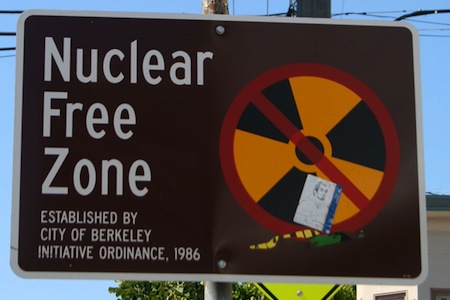Local Governments and National Security Policy

Sign in Berkeley, California proclaiming the city to be a nuclear-free zone. Credit: Flickr/dotpolka.
Can local governments influence national security policy? Congress has the power to appropriate funds for military purposes and to declare war. But local governments sometimes have something to say about this -- especially when national policy has significant effects upon them.
In recent years, as Congress has poured trillions of dollars into the Iraq and Afghanistan wars and into an escalating Pentagon budget, well over half of U.S. federal discretionary spending has been devoted to funding the U.S. military. Meanwhile, federal spending on domestic programs has been sharply curtailed, leaving many cities, counties, and states hard-pressed to cover the costs of education, housing, health care, parks, and other social services.
This squeeze upon localities has led to a gathering revolt. Dozens of local jurisdictions have passed resolutions that call for ending the U.S. military role in Iraq and Afghanistan, reducing the Pentagon budget, and funding domestic programs. Among the cities passing these “move-the-money” resolutions are Hartford, Los Angeles, Cleveland, Portland (ME), Takoma Park, Binghamton, Portland (OR), Charlottesville, Pittsburgh, San Francisco, Richmond (CA), and Philadelphia. In June 2011, the U.S. Conference of Mayors weighed in with a resolution that called upon the president and Congress to “bring these war dollars home to meet vital human needs, promote job creation, rebuild our infrastructure, aid municipal and state governments, and develop a new economy based upon renewable, sustainable energy.”
The latest of these campaigns concluded this fall in Albany County, New York. In this jurisdiction of 304,000 people, housing the capital of New York State, local activists proposed that the County Legislature adopt a proclamation that called upon Congress to withdraw U.S. troops from Afghanistan, reduce U.S. military spending significantly, and use the savings to fund vital public programs at home. Twenty-nine local organizations endorsed this Peace Dividend Proclamation, including the Albany County Central Federation of Labor (AFL-CIO), Upper Hudson Peace Action, the Commission on Peace and Justice of the Roman Catholic Diocese of Albany, Women Against War, the Labor Religion Coalition of New York State, Veterans for Peace, the Interfaith Alliance, and United University Professions.
With Albany County legislator Doug Bullock tenaciously circulating the proclamation and constituents pressing their legislators to sign the measure, it gradually picked up support. On October 9, with 22 of the 39 county legislators having signed the proclamation, it was formally adopted. The following day, the Albany County clerk mailed off copies to President Obama, the entire New York State congressional delegation, Governor Andrew Cuomo, the state legislature, and all departments in the county.
This kind of pressure by localities to change U.S. national security policy is not unique. During the early 1980s, as the Reagan administration engaged in a vast buildup of U.S. nuclear weaponry and the nuclear arms race surged forward, cities, towns, and states rallied behind a proposal for a nuclear freeze. This measure, drawn up by defense analyst Randy Forsberg and promoted by peace groups, called for a Soviet-American agreement to halt the testing, production, and deployment of nuclear weapons. By November 1983, it had been endorsed by more than 370 city councils, 71 county councils, and by one or both houses of 23 state legislatures. The Nuclear Freeze campaign was ferociously resisted by the Reagan administration and a supporting resolution -- after passage by the House of Representatives -- was blocked by the Republican-controlled U.S. Senate. Nevertheless, in the following years, the Reagan administration and its successors reversed U.S. national security policy and implemented the basic ideas of the Nuclear Freeze campaign.
Will the more recent upsurge of protest by localities against U.S. national security policy continue and, ultimately, lead to the federal government “moving the money” from war to peace? That will probably depend in large part on what efforts local activists make in the future -- and perhaps also on the outcome of elections for president and Congress this November.
Related Links

